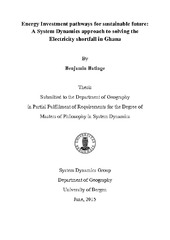| dc.contributor.author | Batinge, Benjamin | eng |
| dc.date.accessioned | 2015-09-03T09:07:01Z | |
| dc.date.available | 2015-09-03T09:07:01Z | |
| dc.date.issued | 2015-06-01 | |
| dc.date.submitted | 2015-06-01 | eng |
| dc.identifier.uri | https://hdl.handle.net/1956/10381 | |
| dc.description.abstract | Ghana has been experiencing electricity supply deficit over the past decade. The annual gap between the electricity demand and supply has been a major concern in the country. Even though the challenges often seem temporary, the problem has never been fully resolved. The electricity gap in Ghana is attributed to underutilization of existing capacity, significant loss of power generated through transmission and distribution, low investment in the electricity sector, and low electricity tariffs. | en_US |
| dc.format.extent | 2817153 bytes | eng |
| dc.format.mimetype | application/pdf | eng |
| dc.language.iso | eng | eng |
| dc.publisher | The University of Bergen | eng |
| dc.subject | electricity supply | eng |
| dc.subject | low investment | eng |
| dc.subject | electricity sector | eng |
| dc.subject | fossil-free future | eng |
| dc.subject | solar | eng |
| dc.subject | private sector | eng |
| dc.title | Energy Investment pathways for sustainable future: A System Dynamics approach to solving the Electricity shortfall in Ghana | eng |
| dc.type | Master thesis | en_US |
| dc.description.version | publishedVersion | |
| dc.rights.holder | Copyright the author. All rights reserved. | en_US |
| dc.description.degree | Master i Master of Philosophy in System Dynamics | |
| dc.description.localcode | GEO-SD350 | |
| dc.description.localcode | MASV-SYSDY | |
| dc.subject.nus | 733199 | eng |
| fs.subjectcode | GEO-SD350 | |
